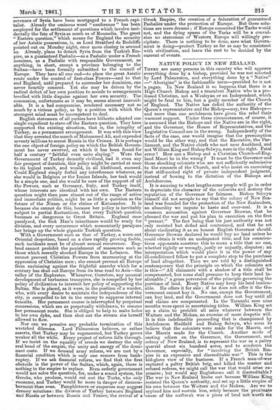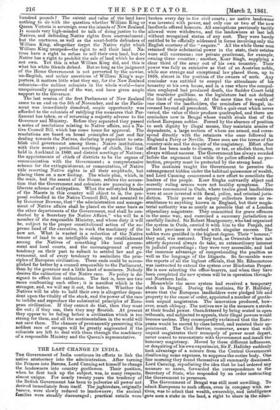NATIVE POLICY IN NEW ZEATAND.
THERE are many persons in this country who will approve everything done by a bishop, provided he was not selected by Lord Palmerston, and everything done by a "Native" —" Aborigine" is the fashionable term—provided he is not a pagan. In New Zealand it so happens that there is a High Church Bishop and a truculent Native who is a pro- fessed Christian, not a Wesleyan or an Independent, which might be fatal to him, but a godly member of the Church of England. The Native has defied the authority of the Queen's representative and the Bishop—nay, two Bishops— and more than one archdeacon have given the rebel their warmest support. Under these circumstances, of course, it is assumed that the Bishops and the Native are in the right, and the Governor, the House of Representatives, and the Legislative Council are in the wrong. Independently of the facts of the case, one would imagine that the presumption would be the other way, and that the Executive, the .Par- liament, and the Native chiefs who met near Auckland, and not William King and Bishop Selwyn, were in the right. Fatal error ! How can a Bishop and a Christian Church-of-Eng- land Maori be in the wrong ? It must be the Governor and those shocki g colonists who are not sufficiently submissive to the counsels of the Church, and who insist on exercising that stiff-necked right of private independent judgment, instead of bowing to the dictation of the Bishops and Archdeacons.
It is amazing to what lengths some people will go in order to depreciate the character of the colonists and destroy the reputation of the Governor for fairness. Bishop Selwyn himself did not scruple to say that the colony of New Zea- land was founded for the protection of the New Zealanders, an absurdity we impute to haste and over-zeal. It is a common accusation against Governor Browne, that he planned the war and pa his plan in execution on the first "pretext." The fact being that his just authority was not only resisted but defied and contemned, and that he set about vindicating it as an honest English Governor should. Governor Browne declared he would buy no land unless he could obtain it with an undisputed title, and his conscien- tious opponents construe this to mean a title that no one, whether rightly or wrongly, justly or unjustly, disputes ; an interpretation which would place it in the power of any ill-conditioned fellow to put a complete stop to the purchase of land altogether. Then we are told by a distinguished contemporary that the principle on which the colonists act is this—" All claimants with a shadow of a title shall 'be compensated, but none shall presume to keep their land in- alienable ;" a gross perversion of the principle governing the purchase of land. Every Native may keep his land inalien- able. He offers it for sale ; if he does not offer it the Go- vernment cannot buy it. No one, except the Government, can buy land, and the Government does not buy until all real claims are compensated. In the Taranaki case nine months were spent in ascertaining titles. William King set up a claim to prohibit all sales whatever between the Waitara and the Mokau, an exercise of mere despotic will. It is this indefensible proceeding that is championed by Archdeacon Hadfield and Bishop Selwyn, who seem to believe that the colonists were made for the Maoris, and the Maoris made for the Church. Another mode of casting odium on the Governor, the Government, and colony of New Zealand, is to represent the war as a paltry quarrel about six hundred acres, and to condemn the Governor, especially, for "involving the British Em- pire in an expensive and discreditable war." This is the kid-glove view of the business. If a French man-of-war captured a paltry British brig, and killed the master and refused redress, we might call the war that would arise ex- pensive ; but would any Englishman call it discreditable ? The war in New Zealand broke out because William King resisted the Queen's authority, and set up a little empire of his own between the Waitara and the Mokau. Are we to applaud him and sustain him, solely because the proximate cause of the outbreak was a piece of land not worth fix hundred pounds ? The extent and value of the land have nothing to do with the question whether William King or Queen Victoria is sovereign over the islands of New Zealand. It sounds very bigh-minded to talk of doing justice to the Natives, and defending Native rights from encroachment ; but the unctuous, as well as the scent-bottle defenders of William King, altogether forget the Native right which William King usurped—the right to sell their land. Na- tives have a right to refuse to sell their own land, but no Native has a right to prohibit the sale of land which he does not own. Yet this is what William King did, and this is what his white friends defend. But so long as the judgment of the Home Government is not perverted by the unwise, un-English, and unfair assertions of William King's sup- porters, it matters little what they say, for the New Zealand colonists—the noblest colonists in the whole world—have unequivocally approved of the war, and have given ample support to the Governor.
The last session of the first Parliament of New Zealand came to an end on the 5th of November, and as the Parlia- ment was immediately dissolved, ample opportunity was afforded to the colonists of ratifying the measures that Par- liament has taken, or of returning a majority adverse to the Governor and Ministry. Before they separated they passed a series of resolutions relating to Native affairs, and a Na- tive Council Bill, which has come home for approval. The resolutions are based on broad principles of just and fair dealing towards the Natives, declaring it expedient to esta- blish civil government among them ; Native institutions, with their assent ; periodical meetings of chiefs, like that held in Auckland in 1860, and district meetings of Natives ; the appointments of chiefs of districts to be the organs of communication with the Government ; a comprehensive scheme for the extinguishment, or commutation, of Native title reserving Native rights in all their amplitude, but placing them on a new footing. The whole plan, which, in the main, had the assent of the House, refutes the accusa- tion that the Government and colonists are pursuing a de- liberate scheme of extirpation. What the self-styled friends of the Maoris in this country will object to is, the pro- posal embodied in the Native Council Bill, and assented to by Governor Browne, that " the administration and manage- ment of Native affairs shall be placed on the same basis as the other departments of the Government, and shall be con- ducted by a Secretary for Native Affairs," who will be a member of the responsible Ministry, and whose duty it will be, subject to the proper constitutional action of the su- preme head of the executive, to work the machinery of the new act. What is wanted is a reduction of the Native tenure of land to an intelligible shape, the establishment among the Natives of something like local govern- ment and local courts, and the encouragement of every tendency on their part to submit to settled law and go- vernment, and of every tendency to assimilate the prin- ciples of European civilization. These ends could be accom- plished far better by a council responsible to the Parliament, than by the governor and a little knot of nominees. Nobody desires the extinction of the Native race. No policy is de- signed to effect that extinction. The fact is, here are two races confronting each other; it is manifest which is the stronger, and, we will say it out, the better. Whether the Natives will be able to hold their own is altogether depen- dent upon the vitality of the stock, and the power of the race to imbibe and reproduce the substantial principles of Euro. pean civilization. If they cannot do that, then they must die out ; if they can, then they may flourish. At present they appear to be fading before a civilization which is too strong for them, and all the sentimentalism in the world will not save them. The chances of permanently preserving this noblest race of savages will be greatly augmented if the colonists are left to deal with them through the machinery of a responsible Ministry and the Queen's representative.































 Previous page
Previous page